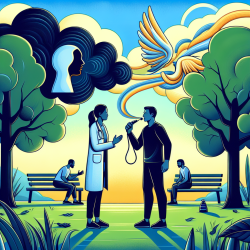Introduction
In the rapidly evolving landscape of healthcare and education, a recent study titled "Toward a More Humanistic American Medical Profession: An Analysis of Premedical Web Sites From Ohio’s Undergraduate Institutions" sheds light on an often-overlooked aspect of medical training: the humanities. The study underscores the importance of integrating humanistic approaches into medical education to foster empathy, professionalism, and cultural competency. As practitioners in the field of speech-language pathology, we can draw valuable insights from this research to enhance our practice, particularly in creating better outcomes for children.
The Case for Humanities in Speech Therapy
The study reveals that while many undergraduate institutions acknowledge the value of humanities, they often prioritize natural sciences in premedical advising. This emphasis on science overlooks the intrinsic value that humanities bring to healthcare professions, including speech therapy. Humanities courses cultivate critical thinking, empathy, and a deeper understanding of cultural contexts—skills that are crucial for speech therapists working with diverse child populations.
Data-Driven Insights
Data from the study indicates that institutions with religious or mission-based affiliations are more likely to emphasize humanities. This suggests a correlation between institutional values and the promotion of a holistic educational approach. For speech therapists, this insight can inform the development of training programs that integrate humanistic elements, thereby enriching the therapeutic process.
Practical Applications for Speech Therapists
Here are some actionable steps that speech therapists can take to incorporate humanities into their practice:
- Interdisciplinary Learning: Engage in courses or workshops that focus on cultural studies, ethics, and communication to enhance your understanding of the diverse backgrounds of the children you work with.
- Empathy Building: Participate in activities that foster empathy, such as role-playing exercises or reflective journaling, to improve your ability to connect with children and their families.
- Cultural Competency: Stay informed about cultural trends and issues that may affect the children you serve, ensuring that your therapeutic approaches are culturally sensitive and relevant.
Encouraging Further Research
While the study provides a compelling argument for the inclusion of humanities in medical education, it also highlights the need for further research. Speech therapists can contribute to this body of knowledge by conducting studies that explore the impact of humanistic approaches on therapy outcomes. Collaborating with educational institutions to advocate for curriculum changes can also drive the integration of humanities into speech therapy training programs.
Conclusion
The integration of humanities into speech therapy practice offers a promising avenue for enhancing the effectiveness of therapeutic interventions. By fostering empathy, cultural competency, and critical thinking, speech therapists can create more meaningful and impactful outcomes for the children they serve. To delve deeper into the research that inspired these insights, I encourage you to read the original paper, Toward a More Humanistic American Medical Profession: An Analysis of Premedical Web Sites From Ohio’s Undergraduate Institutions.










